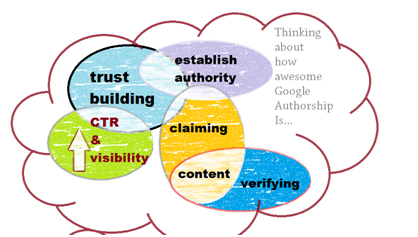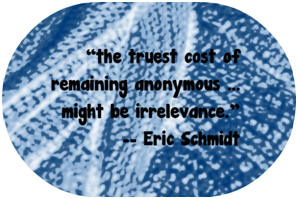UPDATE: We are leaving this post up for history’s sake but Google’s Authorship is no more. Google scrapped the concept by the end of 2013.
What is Authorship?
Google Authorship can basically be thought of as your online, digital signature that directly corresponds with your Google+ profile, where Google would like you to store your manicured and verifiable online identity. Just a quick search on the internet for “Google Authorship” provides a flood of results explaining Google Authorship as well as how to and why you should use it.
Why is it so important, though?
The simple answer, as well as the most accurate, is that Authorship is important because Google really, really wants it to be. Google decided and decreed its importance and has helped proliferate the internet with what appear to be incredibly compelling reasons, particularly for writers, to use Google+ Authorship.
When you sign up, Google provides a “rel=author” mark up to include on your writing, which then ties back to your G+ profile. This, ostensibly, is to increase quality web content, increase authority and build trust for quality writers as well as protecting your original content and increasing ranking on SERPs and improving CTRs.
Authorship can be thought of us Google’s reward for writers who are willing to put their name and reputation at the forefront for content that they created. It is marketed as a natural continuation of the Panda update that swept through the search engine results and came down heavy on a lot of bad content companies that were heavy on links and light on unique, engaging content that web users were interested in. These articles were most often ghost written by anonymous content writers, so there was no accountability for terrible content and no reward for greatness.
So, as a writer, what do I need to know about Google Authorship?
Remember that web search for the phrase “Google Authorship”? Ask yourself why the only results you’ll find are ones promoting and extolling Authorship. There are countless SERPs populated with digital-age John the Baptists crying out, “Prepare Ye the Way for Author Rank with your Diligent Use of Authorship!”
The benefits of Authorship are seemingly numerous for many fairly established writers and bloggers. Here is a visual representation of the glory of Google Authorship.
However, what if you are a writer who sells content to a publisher and ghost writes copy for clients? Those industry-typical publishing companies own your writing and often play a part in editing and promoting your writing (Read My Conversation with Matt Cutts). At this time, Google doesn’t acknowledge authorship for publisher or business G+ pages.
Reputable content publishers compensate writers for the content at fair wages that intrinsically reward quality insights and creative material (what Google claims you need Authorship for). If you, oh Writer, happen to earn a living this way, Google Authorship would require you to sign up for a G+ account to use authorship.
Is this truly a “reward” for writers who produce professional and unique content, or a way to promote G+ accounts with the promise of increased SERPs ranking backed by the echo of Eric Schmidt’s ominous remarks at 2013 SMX West:
“The truest cost of remaining anonymous… might be irrelevance.” While unnerving, writers need to be able to question not only the truth of that statement, but any other assertions encountered time and time again both in life on-line as well as off. Without questioning assertions and providing unique perspectives that often challenge the status quo, writers face the danger of falling in line with the current dotcom doctrine, when in reality, no matter how big Google is (and how awesome many of their products and features actually are), they aren’t the boss of the internet – but sometimes we let them think they are.
For more information on Google Authorship, check out a few of our posts (and others) to make up your own mind about how effective Google Authorship will be for your writing and work.
~Sara
What Would History Say About Google Authorship?





I created a google plus profile after learning that over 100 articles I wrote for a major online magazine are being linked to another woman’s profile (with the same name). Now that I have the profile, I still can’t understand how to divert google plus from her bio to mine. Do you have any suggestions?
Olivia,
Did you wave your rights to the articles in your contract? If not, then contact the magazine and ask them to correct the issue. They’ll need the correct link to your G+ account. Find out more about how to set up authorship here- https://plus.google.com/authorship. Good luck! Let us know what happens.
~MWW
thank you so much for your response, I did sign a contract for each article agreeing that ” …Writer[hereby] grants, transfers, and assigns all right, title and interest in and to the Work, including without limitation to copyrights…” Even so, does that mean they can credit another person for my work by linking to her Google + profile?
Yes, and therein lies the murky waters that Google has inserted itself into with authorship profiles. The magazine paid you for the content and bought the rights. They can link to wrong, to ghost, or even to fake profiles. We’re not qualified to give legal advice, but would suggest that you clarify which rights you want in future contracts. You might have to let this one go. All the best, Olivia! ~Jean @MyWebWriters
Wow, thanks Jean; disconcerting, though. Perhaps it was a fake profile [they linked the articles to] I wonder?! Nevertheless, some “authorship”!
Best,
Olivia
Pingback: Content for Less- Fat Brain Toys Involves Customers in Content Creation | My Web Writers - Website Content & Editing Ideas
Pingback: Ten Most Insightful Questions Asked on Quora (And their Answers) | My Web Writers - Website Content & Editing Ideas
Pingback: Five Authors Share How They Use Social Media | My Web Writers - Website Content & Editing Ideas